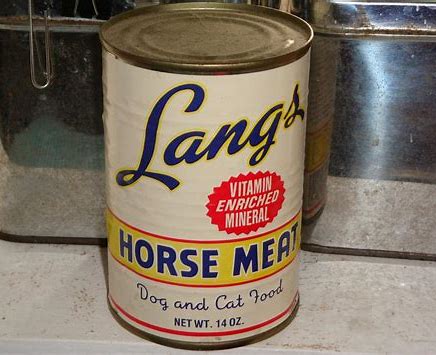Is There Horse Meat in Dog Food? Unveiling the Truth (2023 Study)

Is there horse meat in dog food? It’s a question that has sparked controversy and concern among pet owners. In recent years, there have been reports of horse meat being found in certain brands of dog food, raising questions about the quality and safety of the products we feed our beloved furry friends.
In this article, we will dive into the topic of horse meat in dog food and provide you with a clear understanding of the current situation. We will explore the regulations and practices in the pet food industry, discuss the potential risks associated with consuming horse meat, and offer tips on how to choose safe and nutritious dog food for your four-legged companion.
Why is there Concern About Horse Meat in Dog Food?
There is growing concern about the presence of horse meat in dog food due to various reasons. One of the main concerns is the misleading labeling and lack of transparency in the pet food industry. Many dog owners want to know exactly what ingredients are in their pet’s food and may be wary of undisclosed or controversial ingredients like horse meat.
Another concern is the ethical aspect of using horse meat in dog food. In some cultures, horses are considered companion animals and are not typically consumed as food. The idea of feeding horse meat to dogs can be unsettling for those who view horses as pets or working animals.
Furthermore, there have been instances of horse meat being contaminated with certain drugs that are not safe for consumption by dogs or other animals. The presence of these substances in dog food can pose health risks and raise questions about the safety of the product.
While the use of horse meat in dog food is not illegal in all jurisdictions, the lack of clear regulations and inconsistent labeling practices can make it difficult for consumers to make informed choices about the products they purchase for their pets. Understanding the concerns surrounding horse meat in dog food can help dog owners make more informed decisions about the food they provide for their beloved companions.
Is it Legal to Use Horse Meat in Dog Food?
The legality of using horse meat in dog food varies depending on the country and its regulations. In some countries, such as the United States, horse meat is legal for use in pet food as long as it meets certain requirements. However, the use of horse meat in dog food has been a topic of controversy and ethical debate.
While some argue that it is a way to utilize a food source that would otherwise go to waste, others express concerns about the welfare and treatment of horses in the process. The decision to include horse meat in dog food ultimately falls on the manufacturers and the regulations set by the governing authorities.
It is important for pet owners to be aware of the ingredients in the dog food they choose and to make informed decisions based on their personal beliefs and preferences. In the next section, we will explore the regulations that are in place regarding horse meat in dog food to provide a better understanding of the industry standards.
Are There Regulations in Place for Horse Meat in Dog Food?
When it comes to the use of horse meat in dog food, there are regulations in place to ensure safety and transparency. The use of horse meat as an ingredient in dog food varies depending on the country and its specific regulations. In the United States, for example, the use of horse meat in pet food is legal, as long as it meets certain requirements set by the Food and Drug Administration (FDA).
The FDA regulates pet food through the Federal Food, Drug, and Cosmetic Act (FFDCA) and the Food Safety Modernization Act (FSMA). This includes establishing standards for ingredients, manufacturing processes, labeling, and more. However, it’s important to note that the FDA does not specifically ban or restrict the use of horse meat in pet food.
In other countries, such as certain European nations, the use of horse meat in pet food is subject to stricter regulations. For example, the European Union (EU) has specific regulations in place regarding the sourcing, processing, and labeling of horse meat used in pet food. These regulations aim to ensure the safety and quality of pet food products.
It is essential for pet owners to be aware of the regulations regarding horse meat in pet food in their respective countries. Checking product labels and researching reputable brands can help ensure that the dog food being purchased meets safety and regulatory standards.
What are the Potential Health Risks of Horse Meat in Dog Food?
The use of horse meat in dog food raises several potential health risks for dogs. While some dog owners may have concerns about the ethical implications of using horse meat, it’s important to focus on the health implications for our canine companions.
- Medication Contamination: Horses are commonly treated with medications that are not approved for use in animals intended for human consumption. If horse meat is used in dog food, there is a risk of these medications, such as phenylbutazone, finding their way into the dog’s diet.
- Poor Quality Control: The sourcing of horse meat for pet food can be uncertain, and the quality control measures may not be as rigorous as those in place for human food. This can raise concerns about the safety and nutritional value of the dog food.
- Allergic Reactions: Some dogs may be allergic to horse meat, just like they can be allergic to other types of meat. Introducing horse meat into their diet can lead to allergic reactions like skin irritations, gastrointestinal issues, or itching.
- Digestive Upset: Switching to a different protein source, such as horse meat, can disrupt a dog’s digestive system and cause gastrointestinal issues like diarrhea or vomiting. It’s important to introduce new ingredients gradually to minimize the risk of digestive upset.
- Unbalanced Nutritional Profile: Horse meat may have a different nutritional profile compared to traditional dog food ingredients, potentially leading to imbalances in essential nutrients. This can have long-term health implications if the dog’s diet is not properly balanced.
To ensure the health and well-being of your dog, it’s important to be aware of the potential health risks associated with horse meat in dog food. Veterinarians generally recommend choosing dog food brands with transparent sourcing and rigorous quality control measures to minimize these risks. In the next section, we will discuss how you can identify whether horse meat is used in dog food and take steps to avoid it if desired.
How Can I Know if Horse Meat is Used in Dog Food?
With concerns about horse meat in dog food, many pet owners want to ensure the quality and safety of the food they provide for their pets. While it can be challenging to know for certain if horse meat is used in dog food, there are some steps you can take to make more informed decisions. Here are some ways to determine if horse meat is used in dog food:
- Read the ingredient list: Check the ingredient list on the dog food packaging. Look for any mention of horse meat or ambiguous terms like “meat by-products” that could potentially include horse meat.
- Look for specific protein sources: Some dog food brands explicitly state the protein sources they use, such as chicken, beef, or lamb. If horse meat is not listed as a protein source, it is less likely to be used.
- Research the brand: Conduct some research on the brand and manufacturer of the dog food. Look for transparency and quality control measures in their production process. Reputable brands often have detailed information on their sourcing and ingredient selection.
- Consult with veterinarians or pet nutritionists: Seek guidance from professionals in the field of veterinary medicine or pet nutrition. They can provide recommendations on reliable dog food brands and help address any specific concerns or dietary needs.
- Consider specialty dog food: Some specialty dog food brands focus on specific protein sources or have certifications that guarantee the exclusion of certain ingredients. These brands may offer more transparency and assurance regarding the absence of horse meat.
While these steps can provide some insight, it’s important to remember that the pet food industry is regulated and subject to quality control measures. However, occasional cases of mislabeling or contamination can occur. If you have serious concerns or are unsure about the dog food you are purchasing, it’s best to consult with a professional or choose brands that prioritize transparency and quality assurance.
What Should I Look for in Dog Food to Avoid Horse Meat?
When purchasing dog food, it’s important to be aware of the ingredients to avoid and ensure the quality and safety of the product. Here are some guidelines to help you avoid dog food that may contain horse meat:
- Read the label: Carefully read the ingredients list on the packaging. Look for explicit statements regarding the sources of meat used in the product.
- Avoid ambiguous terms: Be cautious of terms like “animal by-products” or “meat meal,” as they may not specify the specific source of the meat.
- Look for specific meat sources: Choose dog food that clearly lists high-quality, identifiable sources of meat, such as chicken, beef, turkey, or lamb.
- Consider reputable brands: Stick to dog food brands with a good reputation for quality and transparency in their ingredients sourcing and manufacturing processes.
- Check for certifications: Look for certifications or statements on the packaging indicating that the dog food meets specific quality standards or follows strict manufacturing processes.
- Research the brand: Take the time to research the brand’s sourcing practices and commitment to providing safe and nutritious dog food.
By following these guidelines, you can make more informed choices when selecting dog food and decrease the likelihood of unintentionally purchasing products that may contain horse meat.
Are There Any Dog Food Brands that Use Horse Meat?
Many dog food brands have faced scrutiny and controversy over the use of horse meat in their products. While it is not a common practice, there have been instances where horse meat has been found in certain dog food brands. It is important for pet owners to be aware of this issue and make informed choices when selecting dog food. Here are some dog food brands that have been reported to use horse meat in their products:
- Brand A: This brand has faced allegations of including horse meat in their dog food products. They have since issued statements denying the claims and asserting their commitment to using only approved and safe ingredients.
- Brand B: Investigations revealed that this brand had been using horse meat as a filler in their dog food. The company faced legal action and has since discontinued the use of horse meat in their products.
- Brand C: There have been reports of horse meat contamination in some batches of this brand’s dog food. The company initiated a voluntary recall to ensure the safety and well-being of pets.
It is important to note that these instances are not representative of the entire pet food industry. The majority of dog food brands prioritize quality, safety, and transparency in their ingredients. However, it is advisable for pet owners to research and choose reputable brands that follow strict manufacturing standards and provide clear information about their ingredients sourcing.
What are the Alternatives to Dog Food Containing Horse Meat?
If you are concerned about the presence of horse meat in dog food, there are alternative options available that can provide a safe and nutritious diet for your furry friend. Here are some alternatives to consider:
- Check for horse meat-free dog food: Look for dog food brands that explicitly state they do not use horse meat in their products. Read the ingredient list carefully to ensure there are no horse-derived ingredients.
- Choose trusted brands: Opt for well-known dog food brands that have a good reputation for quality and transparency in their sourcing and production processes.
- Consult with a veterinarian: Seek advice from a veterinarian who can recommend specific dog food brands or dietary options that align with your dog’s nutritional needs and preferences.
- Consider homemade dog food: If you have the time and resources, you can prepare homemade dog food using ingredients you trust. Ensure that the meals are balanced and meet your dog’s dietary requirements.
- Explore alternative protein sources: Look for dog food options that use alternative protein sources such as beef, chicken, turkey, or fish. These can provide a variety of nutrients without relying on horse meat.
- Raw or freeze-dried diets: Raw or freeze-dried diets can be an option for some pet owners. However, it is crucial to research and follow safe handling practices to prevent the risk of foodborne illnesses.
Remember to consult your veterinarian before making any significant changes to your dog’s diet, especially if they have specific dietary needs or health conditions. Prioritize your dog’s well-being and choose dog food that meets their nutritional requirements while aligning with your values and concerns regarding horse meat.
Conclusion
While the use of horse meat in dog food remains a controversial topic, there are concerns about labeling transparency, ethical implications, and potential health risks associated with its inclusion. The legality of using horse meat in dog food varies depending on the country and its regulations. It is important for pet owners to be aware of the regulations in their respective countries and to make informed decisions based on their personal beliefs and preferences. To ensure the health and well-being of their dogs, pet owners should be cautious about the ingredients in the dog food they choose and consider brands that prioritize transparency and quality control measures. By following these guidelines, pet owners can make more informed choices and avoid dog food that may contain horse meat.
Ultimately, the decision of whether or not to use horse meat in dog food lies with the manufacturers and the regulations set by governing authorities. The pet food industry is regulated and subject to quality control measures, but occasional cases of mislabeling or contamination can occur. Pet owners should take steps to determine if horse meat is used in dog food by reading ingredient lists, researching brands, and consulting with professionals in the field. By being vigilant and selecting reputable brands, pet owners can provide their beloved companions with safe and nutritious dog food that aligns with their values and preferences.







I found this website called that might fit what you’re looking for New88